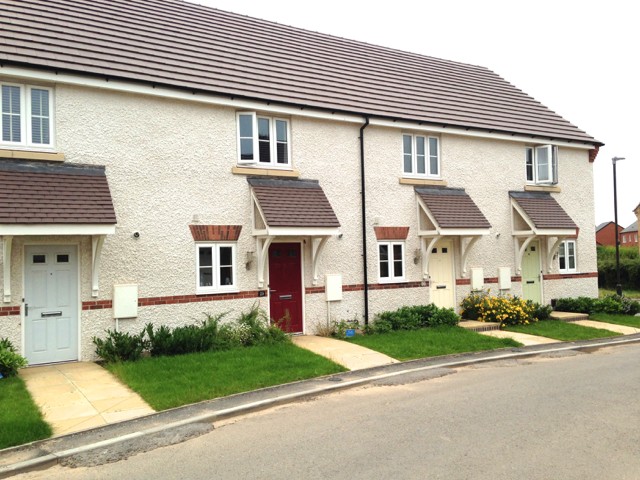What if I want to buy, but can’t afford a property on my own?
How do I buy with another person when I can't afford to buy alone?

If you want to get on the property ladder but cannot afford to do so alone, don’t worry, there are options available to you, some of which you may not have considered.
Read our step-by-step guide below if you need help buying a house.
Buy a property with somebody else
Buying with somebody else gives you extra buying power and could help you get on the ladder. But before you consider this, it is important to know about the two ways of owning property:
Should you buy as Joint Tenants or Tenants in Common?
When buying property with another person or people as opposed to a spouse, you will typically buy as tenants in common, so you can leave the property to whom you choose.
Joint tenants
- Joint owners of equal shares
- In the event of one of their deaths, the property automatically passes to the surviving partner
- Usually used by married couples buying their family home.
Tenants in common
- Can purchase unequal shares in the property
- Protects your share as you can leave it to anyone you choose in your will
- More suitable option if buying with a partner without the security of marriage or a civil partnership, if purchasing with one or more friends, or if you will be making unequal contributions either to the deposit or mortgage.
Make sure you discuss this with your legal company. Find out more about buying legals here.
Who could you buy a property with?
Buy with a partner
This is probably most common way of getting on the property ladder if you can’t afford to do so on your own. It is important to consider what would happen to the property if you split up, eg could one of you afford to buy the other one out? What if the property loses value and you can’t afford to sell?
Buy with a friend
Living with friends is a popular choice, especially among those who have enjoyed this lifestyle at university. In fact, our MD Kate Faulkner made her first foray into property ownership in this way.
As well as taking the precaution of buying as tenants in common, you should also lay down some ground rules and make sure expectations are clear, not just around household chores but around use of communal areas, who gets the larger bedroom, ownership of appliances and furniture, etc.
A written agreement is a sensible precaution as it will highlight what to do if you fall out, or if one of you needs to move on, and how you handle the split, and what to do with the property.
Read our guide to buying property with a friend.
Share ownership with a parent
Many first-time buyers are helped out by the Bank of Mum and Dad to boost their deposit, but what if this still isn’t enough? Ownership of a property can be shared between you and one or both of your parents, but there are implications, most notably for stamp duty.
Stamp duty
If a parent is named on the title deeds, you will normally miss out on the first-time buyer’s stamp duty exemption, assuming it is not a first home for the parent owner. As well as missing out on the exemption, there may be an additional 3% stamp duty to pay across the full purchase price, as it could be considered a ‘second home’ for the parent owner.
However, it may be possible to secure a “joint borrower sole proprietor” mortgage, which allows you to purchase with one or both parents but only have your name on the deeds, thus enabling you to qualify for first-time buyer’s stamp duty relief.
It is important to consider that, as joint borrowers, your parents would still be “jointly and severally liable” for the mortgage payments, if you fell into arrears.
Read our guide to buying property with a friend
- On selling the property, your parents could be liable for capital gains tax if the gain exceeds their allowance;
- You credit score will become linked with that of your parents;
- Your parents’ home could be at risk if you fall into mortgage arrears.
Before you make any decisions, it is always advisable to talk to a tax expert such as Nicholsons or RITA4Rent as they will be able to advise on your particular circumstances.
Buy with a family member as guarantor
Similar to when renting, a guarantor agrees to pay your mortgage if you are unable to meet your obligations. With a guarantor mortgage, they also agree to use their own home or savings as security.
Unlike buying as joint owners, you would be the sole owner, which means you could take advantage of the first-time buyer stamp duty exemption. After a defined period, or when a certain portion of the mortgage has been paid off, the lender may agree to the removal of the guarantor.
Buying with a sponsor
This is similar to purchasing with a guarantor, but both your income and that of your sponsor is taken into account, giving you greater borrowing power. You can choose whether to include the sponsor on the deeds, which has implications for the stamp duty exemption.
Family offset mortgages
Some lenders are now offering mortgage products specifically for people wishing to purchase with parental or other family support. These are similar to buying with a guarantor and allow your parents to offset their savings against your mortgage. As you would be the sole owner, you still get your first-time buyer’s stamp duty exemption.
To find out more about what mortgage options are available to parents – especially if they have more than one child to help – see our checklists:
When purchasing a property with somebody else, it is always wise to seek specialist and independent legal advice. Read how to choose a legal company.
Shared ownership
If you cannot afford to buy a whole property, you may be eligible for shared ownership (co-ownership in Northern Ireland), where you purchase a share of the property through a housing association and pay subsidised rent on the remainder. Your household income must be less than £80,000 a year (£90,000 in London).
If your circumstances change, you have the option of “staircasing”, ie purchasing further shares in the property.
When you want to sell the property, the housing association has first refusal, unless you now own the whole property.
Read our guide to buying a shared ownership property.
| Financing a shared ownership property |
 |
Shared ownership with self-build
There is an innovative scheme operated in Liverpool by Housing People Building Communities where buyers (called “home partners”) are given a £10,000 discount on a new build property in return for putting in 500 hours of their time, either in administration or on the construction site itself. Other volunteers travel from all over the world to work on the site and costs are also kept down by using donations of money and materials.
Qualifying families – who live or work in the city or have strong family connections there – must be able to secure a mortgage for at least a 50% share of the property, and afford to pay rent on the remainder.
Rent to Buy
There is very limited availability under the Rent to Buy scheme but if you can find a suitable property – through a Help to Buy scheme – you can rent a new build at a 20% discount, usually for up to five years, although this can vary. Theoretically, this reduced rent allows you to save up for a deposit on a home.
During this initial period, you have the option to purchase the property, or a share of it under the shared ownership scheme (see above). After five years, you must make a purchase or move on.
To be eligible, you must meet all of the criteria:
- Have an annual household income of £60,000 or less (£64,300 in London)
- Be a first-time buyer, or you used to own a home but can’t afford to buy one now
- Have a good credit history
You can purchase alone, with a partner or friend – it is your combined income which is calculated for the eligibility criteria.
The scheme is available through Help to Buy agents; in London, you should check the Homes for Londoners website. It may have a different name in your area – eg Rent to Own in Northern Ireland – so don’t just rely on a web search, ask your Help to Buy agent.
Starter Homes scheme
There are plans, via the Starter Homes scheme, to allow first-time buyers aged 23-40 with a household income of up to £80,000 (£90,000 in London) to purchase a new build up to £250,000 (£450,000 in London) at a 20% discount.
A word of caution: this scheme was announced in 2014 but the website still says “coming soon”. In May 2018, The Guardian reported that no homes had yet been completed. For now, you can register your interest in the scheme here.
Get government help towards a property deposit
Don’t forget you can get government help towards your deposit if you are a first-time buyer through one of the following:
Help to Buy
This is available on new build properties and sees the government lend you 20% of the purchase price towards your deposit. This loan is interest-free for the first five years.
| Help to Buy checklist - Barratt Homes |
 |
Lifetime ISA/Help to Buy ISA
You can get free money from the government through the Lifetime ISA or Help to Buy ISA. In both savings schemes, the government will top up your savings by 25% when you purchase a property as a first-time buyer, although terms and conditions naturally apply. We weigh up the pros and cons of both schemes here.
Buying a home isn’t always cheaper than renting, depending on your location. Here’s how to work out which is right for you.
Can’t work out if you can afford to buy a home? Do get in touch and we will do our best to help you.
